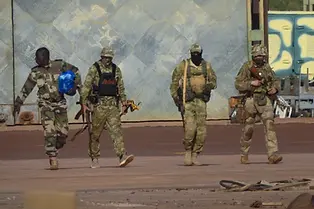
Russian Wagner Group mercenaries pictured in a training formation, highlighting the group's role in military operations across Africa and the Middle East. [Photo Credit: Ministry of Defense of the Russian Federation via Flickr / Creative Commons.]
A Wagner-affiliated Telegram channel announced the Russian private military company’s (PMC) withdrawal from Mali, declaring “mission accomplished.”
Published:
June 16, 2025 at 4:11:00 PM
Modified:
June 16, 2025 at 4:11:00 PM
Russia’s controversial private military company (PMC), Wagner Group, has officially announced its withdrawal from Mali, signaling the end of a turbulent chapter marked by combat operations, political entanglements, and questions of sovereignty. But while Wagner's exit may mark a transition, it does not spell the end of Russian military involvement in Africa.
The declaration came via a Wagner-affiliated Telegram channel on June 6, stating "mission accomplished" after years of involvement in Mali’s internal conflict. Yet experts say the move is largely a bureaucratic rebranding. The personnel, command structure, and logistics once tied to Wagner are now being folded into a new Russian Ministry of Defense-controlled entity: Africa Corps.
Following the 2023 deaths of Wagner’s founders, Yevgeny Prigozhin and Dmitry Utkin, Russia has gradually formalized Wagner’s African operations under official military oversight. This transformation is especially visible in Mali, where Wagner’s previously independent field commanders are now answerable to Africa Corps' rigid command structure.
The change comes with significant implications. Africa Corps, unlike Wagner, is known for its centralized decision-making and aversion to operational risk. This shift could clash with the expectations of Mali’s military junta, which had grown accustomed to Wagner’s direct, often aggressive battlefield tactics.
In Mali, Wagner’s presence began in 2021 as a strategic partner in the fight against jihadist groups and internal insurgents. Despite the formal role as advisors to Mali’s armed forces (FAMa), Wagner units often operated autonomously. Their success on the ground, similar to earlier interventions in the Central African Republic (CAR), solidified their reputation.
But the transition to Africa Corps was far from seamless. With Russia’s focus on Ukraine draining resources, a full replacement of Wagner’s combat-ready units proved logistically challenging. Some Wagner fighters resisted joining Africa Corps, and operational independence lingered in the field even as formal control shifted.
The recent withdrawal announcement is thus less a retreat and more the final phase of negotiations between Wagner units and Russian defense officials in Bamako. It marks the incorporation of Wagner's presence into Africa Corps’ more structured framework.
While Mali has witnessed the most publicized transformation, Russia’s broader military strategy in Africa is still evolving. In Libya, Wagner forces have been fully absorbed into Africa Corps and bolstered with new weaponry and units. The country has become a strategic hub, with the port of Tobruk functioning as a
Russian logistics base and Haftar-controlled territory hosting aviation assets.
In Sudan, the involvement is less overt. Though Africa Corps lacks a formal footprint, military specialists reportedly support General Abdel Fattah al-Burhan in his struggle against the Rapid Support Forces.
Elsewhere, including Burkina Faso, Niger, and Equatorial Guinea, Russian intervention began post-Prigozhin. Africa Corps now leads training and equipment maintenance missions in these nations, roles previously handled by Wagner.
The Central African Republic remains the last major outpost where Wagner still operates under its original structure. Its leaders there have been lobbying to preserve autonomy, arguing that Wagner’s blend of military, commercial, and political capabilities surpasses that of conventional missions like those of the EU. For now, the Kremlin appears willing to tolerate this exception.
Still, a superficial rebranding of Wagner’s presence in CAR may be on the horizon, even if the personnel and strategy remain intact. The bigger question is how Russia will sustain these overseas operations as costs mount and domestic pressures grow.
Russia’s ambitions in Africa are far from waning. Institutions like Rosatom, the state nuclear energy agency, are poised to deepen their presence in Africa. Building nuclear infrastructure in unstable regions would necessitate robust security measures, perhaps the perfect job for Africa Corps.
Moreover, if the war in Ukraine slows or ends, Russia will face mounting pressure to repurpose or redeploy soldiers returning from the front. Africa, with its security gaps and strategic opportunities, may become a release valve for this manpower.
Wagner’s “mission accomplished” in Mali is more symbolic than substantive. The private army’s role in Africa may be changing names, but Russia’s footprint is far from shrinking. As the Kremlin balances cost, influence, and military pragmatism, Africa Corps is becoming the new face of Moscow’s enduring, and evolving, ambitions across the continent.
Keep Reading

